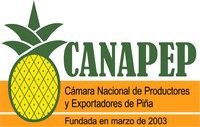The National Chamber of Pineapple Producers and Exporters (CANAPEP) has requested that the authorities of the Ministry of Finance and Public Security scan 100% of the containers loaded with fresh and industrial pineapple that the country exports, regardless of the destination port, to prevent these exports from being used for drug trafficking.
The seizure of pineapple containers with drugs in the United States and Europe in recent months has affected the image of the country and the industry in general. Thus, the chamber and its associates demand the corresponding authorities scan and monitor the shipments of the products more accurately before they are exported.
“Costa Rica exports an average of nearly 2,000 containers of pineapple per week. The APM Terminals concessionaire currently has the technological capacity to scan all these loads, which would prevent some pineapple exports from being used to transfer any type of drugs, as has been happening,” said Abel Chaves, the president of CANAPEP.
He also said that, even though APM Terminals has the equipment to provide this service in Moin, they have stated that they are willing to install a new scanner if it's needed. To improve the monitoring, the Remote Inspection Center (CIR) needs to streamline the analysis and interpretation of the images, otherwise scanning all of the containers makes no sense. This part of the process needs to be carried out in real-time to avoid loading the ships with any contaminated cargo that will be intercepted by authorities in the destination countries; something that recently happened with a container of fresh pineapple that arrived at Rotterdam in the Netherlands.
The scanner in Moín has the capacity to scan 3,500 to 4,000 containers a week, Chaves said. Thus, it could be used to scan exports of other products, such as bananas, chayote, roots and tubers, or the imports that enter the country through this port terminal to control their entry and prevent any smuggling.
Chaves also recommended scanners be installed at the Caldera port terminal, as the containers are loaded with fresh export products, such as pineapple and/or bananas, each week; an aspect that must be considered when signing a new contract with the current concessionaire or any other.
For more information:
CANAPEP
www.canapep.com










